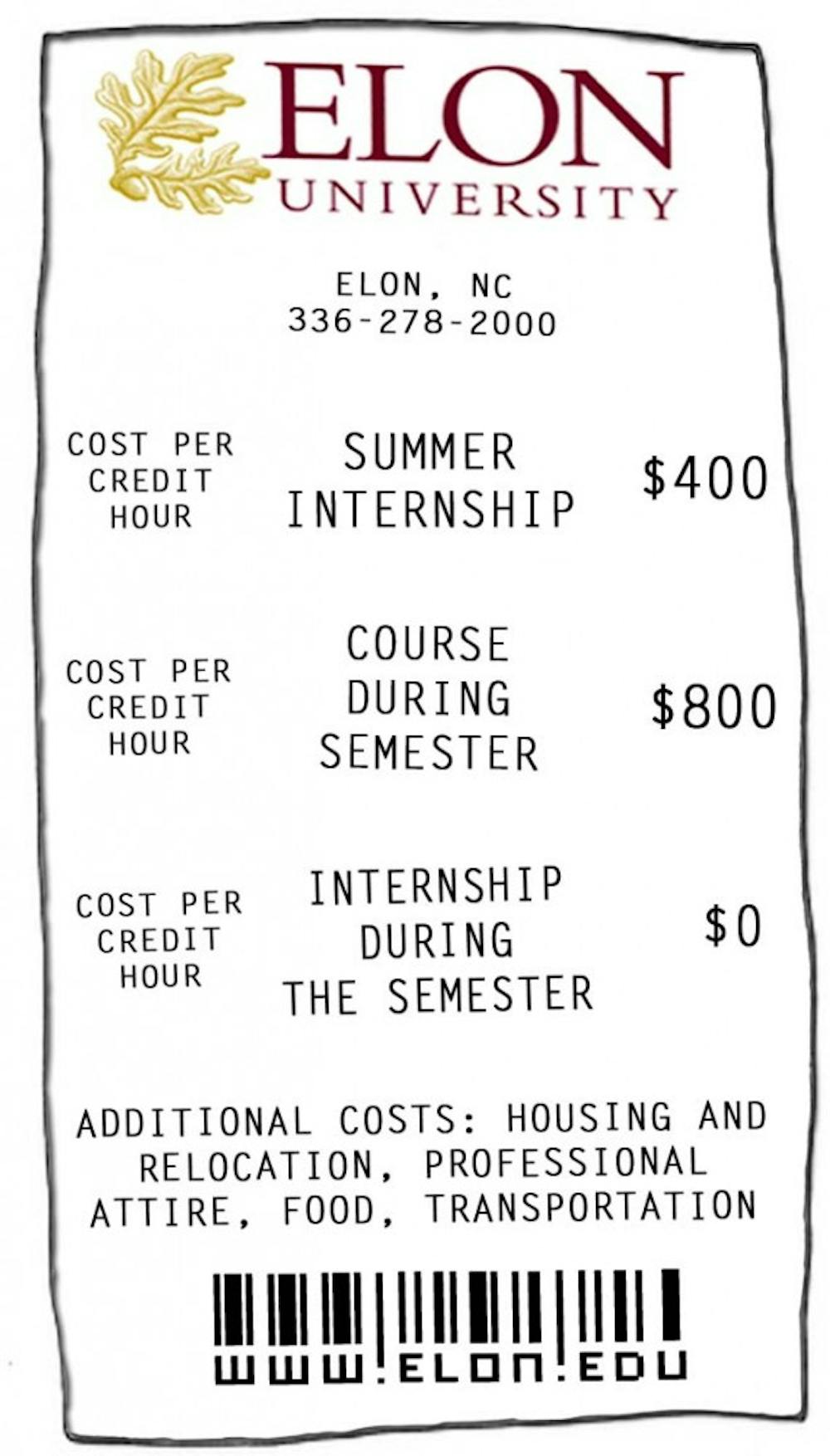Junior David Campbell has completed two summer internships but only registered for academic credit for one because of the related cost.
Campbell, an accounting and finance major, said he works two jobs on campus and is on the board of two campus organizations, making an off-campus internship during the school year impractical.
"It is unfair to take students who are excelling in school and extracurricular activities during the academic year and tell them they must also take on (an internship) or else they'll be forced to pay for it during the summer," Campbell said. "The expenses of a summer internship, relocation, professional attire and transportation costs are already burdensome on a college student's budget."
In spite of the cost of credit hours in the summer and the extra step students must take to register for an academic internship, internship coordinators at Elon say they believe doing an internship for academic credit is worth the additional effort.
There is no additional charge for internship credit completed during the academic year, as long as a student does not register for more than 18 credit hours. Approximately half of the students at Elon who intern do so during summer sessions, according to Pam Brumbaugh, director of experiential education. Based on the most recent tuition costs, students must pay the university $400 per credit hour to be enrolled in an internship.
Brumbaugh said that of the 1,200 internships for which Elon students received credit during the June 2010 – May 2011 academic year, 649 were during the summer. The rest were fairly evenly distributed among the fall, winter and spring semesters, she said.
"I'm very aware that money is tight," Brumbaugh said. "In some cases, it's very, very difficult to put money together, so in that situation I suggest that folks consider just taking one credit. If a person has the money and wants to do four credits, they can, but one credit at $400 is half the price of a credit during the year."
Patrick Murphy, director of financial planning, said funding for summer financial aid comes from the university's annual financial aid budget.
"What I have for summer school is what is left after all the awards are given for fall and spring," Murphy said.
In previous years, he said the Office of Financial Planning has been able to cover about half the cost of summer tuition for students who qualify for financial aid. This year, 72 students received financial aid during summer sessions.
"There's usually not that many people who take summer classes and qualify for financial aid when it comes down to it," Murphy said.
Brumbaugh said after studying learning theory for years, she believes having someone guiding students through the internship process, discussing it with them and asking for written reflections is well worth the money paid.
"The learning occurs and is deepened because of the preparation and the reflection," she said. "The learning does not necessarily come from the doing. I've seen that interns come out more knowledgeable about what they've done and hopefully have gotten some help with networking because they're affiliated with Elon and someone at Elon is their mentor."
But to some students who don't receive help with payment for a summer internship, the expense doesn't seem justified since they are spending their summer working to gain experience in their fields.
Senior Julia Murphy, who interned in Washington, D.C. last summer, said she is curious why she has to pay for a summer internship when it is required for students in the School of Communications.
"Most internships advertised are during the summer, anyway," she said. "I question where the money goes."
Brumbaugh said the cost is spent the same as all tuition money and there is no specific breakdown of where the funds go.
Elon's internship coordinators, such as Nagatha Tonkins, director of internships for the School of Communications and Kehaya Wescott, former internship coordinator for the Love School of Business, put time into helping students succeed at their internships throughout the year.
"I see Nagatha with her 150-200 interns in the summertime, spending all of her time making contacts and grading and talking with supervisors, arranging presentations and telling faculty about students and what they're doing," Brumbaugh said. "And I don't think that same thing would happen when students are out on their own."
Murphy said while she was interning at the Smithsonian Institution, she had little interaction with anyone from the university regarding her internship.
"I know there are some times when the system doesn't work like I'm saying it does," Brumbaugh said. "But usually there is a person helping prepare, giving academic assignments, hopefully doing a site visit or at least staying in touch, troubleshooting if there's a problem, doing a debriefing when students get back and helping with a presentation if such is required by the department."
One way to counteract the cost of summer internships, Brumbaugh said, is to find paid internships, which have been difficult to secure in recent years because of the nation's economy. Previously, roughly half of the Elon students who interned were paid, but Brumbaugh said that number fell several years ago and is slowly rising again.


